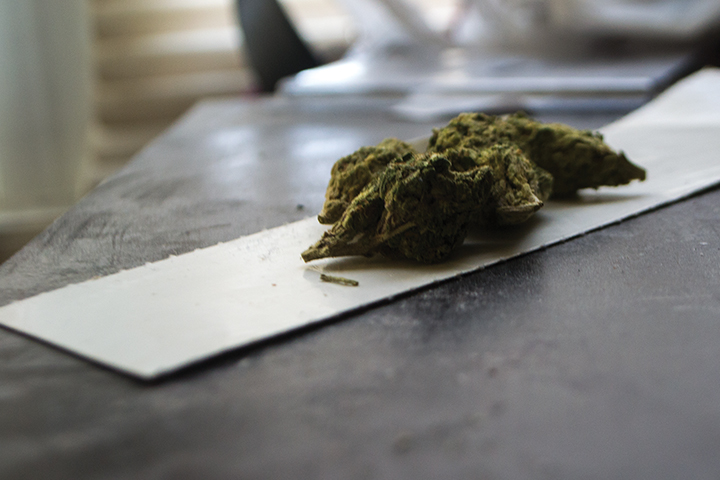
Marijuana
Following in the footsteps of the nation’s capital, which decriminalized possession of small amounts of marijuana Tuesday, this state is forging ahead on measures that would ease the criminal consequences of using and possessing the drug.
At a time when support of recreational marijuana use is gaining momentum — a Gallup poll from October showed 58 percent of Americans favor legalization — lawmakers in this state have proposed several bills this session to decriminalize, legalize, tax and regulate the drug.
One bill, sponsored by Del. Curt Anderson (D-Baltimore City) and Sen. Jamie Raskin (D-Montgomery), would legalize, tax and regulate the use and possession of marijuana for people 21 years of age and older. Another bill, sponsored by Sen. Bobby Zirkin (D-Baltimore County), would ease the legal burden for possession of the drug, making possession of less than 10 grams of marijuana a civil offense carrying a $100 fine, as opposed to a criminal offense carrying jail time, a fine or both.
“I think we’re coming to the point in society asking the question, ‘Why are we spending so much money on this drug that frankly isn’t as dangerous as many prescription drugs you can find on the market?’” said Del. Ben Barnes (D-Anne Arundel and Prince George’s), one of the House bill’s sponsors.
Legalization could boost the state’s economy, Barnes said, and the bill could bring in increased revenue from associated taxes and registration fees from marijuana establishments for the 2015 fiscal year, according to a state analysis.
A bill was introduced last year that would legalize, tax and regulate the drug. It was granted a hearing before the House Judiciary Committee but never made it to a committee vote that would bring it to a final vote on the floor. Similarly, Zirkin introduced a bill last year aimed at easing the penalties for possession that passed a vote on the Senate floor but never made it through the House.
Barnes said he doesn’t think people can argue the drug is bad or as dangerous as some other drugs such as opiates and cocaine, “and yet, we’re spending an exorbitant amount of money policing, jailing offenders.”
Peter Reuter, a public policy professor, said he thinks marijuana usage has decreased over the years. If it is legalized for recreational use, state residents might expect to see an increase. However, he said he doesn’t anticipate much change.
“It sounds perverse, but the fact of the matter is, even before decriminalization, the risk of getting arrested is very low,” Reuter said. “You come to a college campus and ask, ‘What are the risks faced by kids who use it?’ I think the answer is, ‘There’s very little risk.’”
Mike Siegel, a sophomore journalism major, said he knows people who smoke on the campus and that they would continue regardless of whether the bill passes. If any legalization measures pass, he said, he would expect to see the university put some restrictions on marijuana because it wouldn’t want to “encourage people” to use the substance.
“If people smoke weed, they’re going to keep doing it no matter the legislation. Just like the campus ban on smoking, people are still going to keep doing their thing,” Siegel said.
Mikayla Hellwich, a senior horticulture and crop production major, is the outreach coordinator for the on-campus chapter of Students for Sensible Drug Policy, an international organization that advocates ending the U.S.’s more than 40-year-old war on drugs.
Decriminalization and legalization are two different concepts, Hellwich said. Legalizing the substance would implement a regulated system for the purchase and sale of the products, much like alcohol or tobacco. Decriminalization would eliminate the legal repercussions, she said.
“One of the main reasons I do this is because I care about people,” Hellwich said. “I think it’s horrible to just throw somebody in jail — and destroy many of their opportunities by throwing them in jail — just because they were in possession of something that is less harmful than what we already regulate.”
Barnes said whether it is this year or next, the likelihood of decriminalizing the substance is high. Hellwich, on the other hand, said it might take more time to pass these bills, as Gov. Martin O’Malley has not shown full support for marijuana reform.
Some people misunderstand or don’t fully realize the implications of the substance, and as people become more aware of what it “does and doesn’t do,” they might be more accepting, Barnes said.
But some people think marijuana use could open the door to more dangerous substances, Reuter said.
It’s unclear whether marijuana would be a substitute for, go in conjunction with or have no correlation with alcohol consumption, Reuter said. If there is increased marijuana use and binge drinking decreases, it will be a net positive, he said.
The effects of this kind of law are not known for certain, but the state can analyze effects in other states that have already passed the legislation, such as Washington and Colorado, Barnes said.
“Decriminalizing or legalizing weed doesn’t actually make more people do it,” Hellwich said. “People who care about smoking weed already do.”



